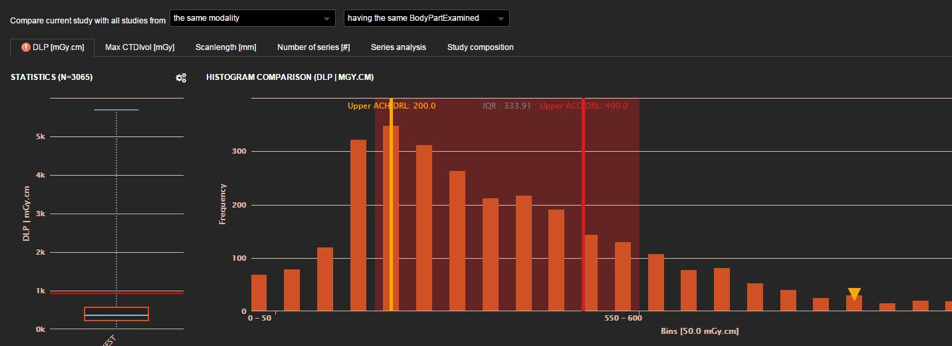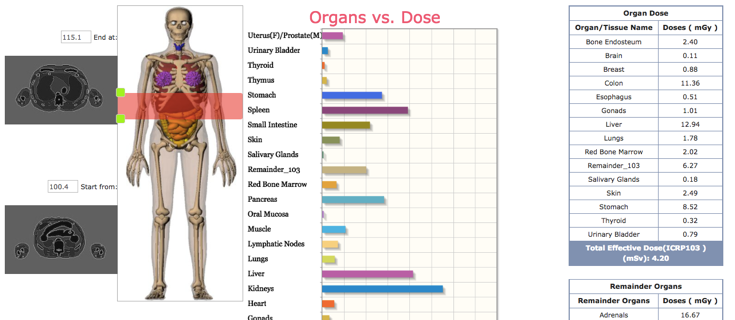QAELUM Announces Partnership with Virtual Phantoms, Inc to Add Organ Dose Data to Radiation Dose Monitoring Software
(12th January 2017) — Qaelum NV, of Heverlee, Belgium, and Virtual Phantoms, Inc of Albany, NY USA announced today that they have entered into a partnership to bring the VirtualDose™CT organ dose tool to the Qaelum radiation dose monitoring solution, DOSE. With this partnership, Qaelum further optimizes their software solutions dedicated to patient safety and efficiency in medical imaging.
 |
|
Patient safety in medical imaging is a priority
With increasing awareness of the risk of radiation dose, patient safety is a high priority in medical imaging departments. Radiation dose during medical examination can be optimized and monitored by DOSE, one of the total quality monitoring solutions of Qaelum, a KULeuven spinoff.
As the different organs of a human body are of variable dimensions and variable tissue composition, specifying organ radiation dose requires models that take all these variables into account. “We are pleased to announce that advanced organ-dose calculation functionality is now available in DOSE, thanks to partnership with VirtualDoseCT and Virtual Phantoms, Inc.,” said Jurgen Jacobs, CEO of Qaelum NV. “The inclusion of organ dose is a useful addition to our available metrics for tracking performance and compliance and supporting patient safety, furthering the goal of Total Quality Monitoring that our software provides.”
 |
 |
Advanced models are used for organ dose simulations
This agreement makes the Virtual Patient technology, a well-tested family of anatomically correct phantoms, advanced GPU-based Monte Carlo simulation, and innovative SaaS programming techniques, available to Qaelum customers. It enables users to accurately compute doses to radiosensitive organs for a broad range of the patient population, including those outside the “average” body size, and pediatric patients from newborn through adolescence. The VirtualDoseCT calculation engine integrates seamlessly with the Qaelum software, providing improved information without extra effort on the part of the user.
“We are thrilled to extend the use of our VirtualDose technology to Qaelum customers through this new partnership, and by doing this, improve patient safety in medical imaging worldwide” said Dr. George Xu, founder and CEO of Virtual Phantoms, Inc.

A display screen from the QAELUM DOSE software

An example output from VirtualDoseCT
ABOUT QAELUM N.V.
QAELUM is a high-tech spin-off company of the University Hospitals Leuven. Based on more than 15 years of quality assurance experience in an academic environment as well as in the field, QAELUM is considered as the preferred partner when it comes to medical imaging quality control. Leading hospital groups share our vision of a global system for quality assurance, which realizes optimal use of radiation and guarantees maximum safety for patients and staff. At the same time, they acquire a more detailed overview of and deeper insights into all quality related aspects.
Passionate about solving real world problems, QAELUM focuses on the development and deployment of highly innovative solutions and services to resolve the daily problems of every medical imaging professional. Ranging from automated quality control in nationwide breast screening programs to optimized solutions for local patient dose monitoring, QAELUM has solutions for all these problems regardless of the scale. The combination of advanced software tools and expert knowledge in the field, makes the innovative solutions offering a preferred choice for healthcare professionals.
| Jurgen Jacobs PDG E-mail: jurgen.jacobs@qaelum.com Gsm: +32 472 801293 |
Sofie Ignoul Marketing Communication E-mail: Sofie.Ignoul@qaelum.com Gsm: +32 497 780176 |
About VPI
Virtual Phantoms, Inc. was founded in 2009 by faculty members from Rensselaer Polytechnic Institute, in collaboration with the University of Florida, with an exclusive license of the “Virtual Patient” technologies developed from nearly 20 years of research at RPI and UF in the field of nuclear and radiological engineering. Combining a large collection of anatomically accurate models of patients of various ages and sizes and sophisticated “Monte Carlo” simulation methods originally developed for nuclear weapons research at Los Alamos in the 1940s, VPI is recognized as a world leader in the modeling of ionizing radiation, radiation safety, and medical/occupational radiation dosimetry. For more information about Virtual Phantoms or VirtualDose™CT, visit www.virtualphantoms.com or call or email Peter Caracappa, VPI Chief Technology Officer; +1 518-421-6931, peter.caracappa@virtualphantoms.com.


